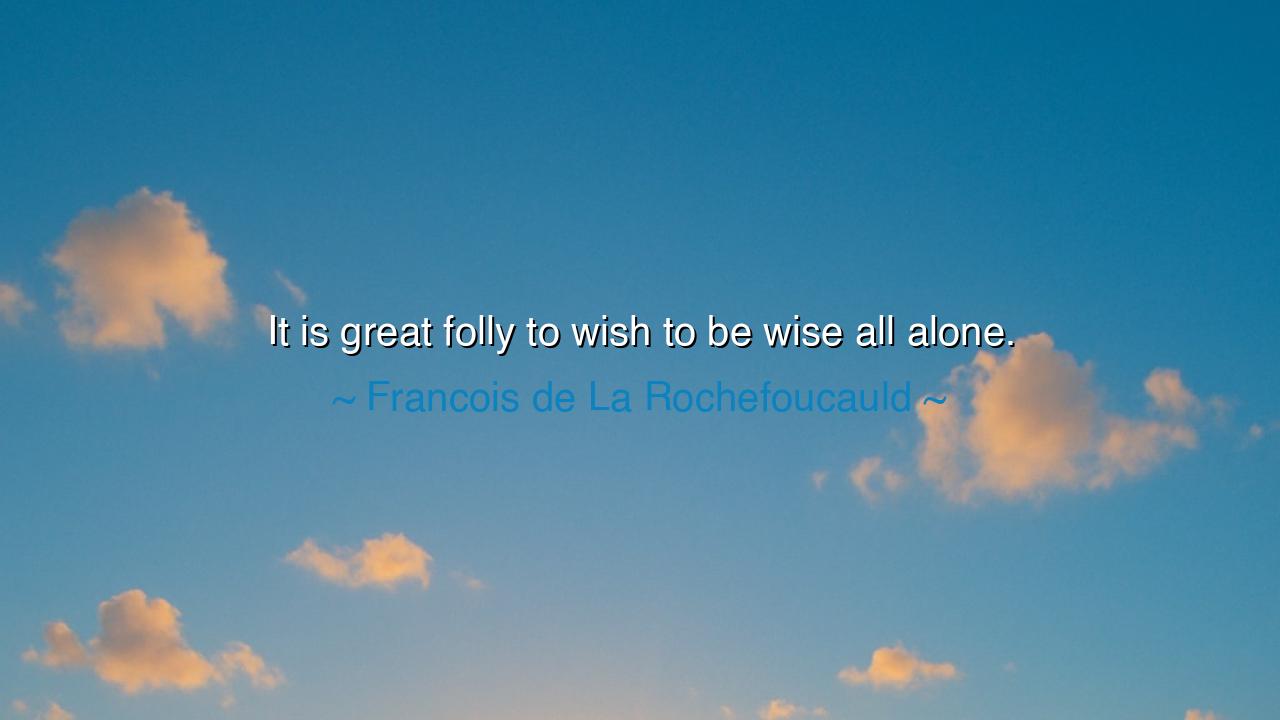
It is great folly to wish to be wise all alone.






The noble thinker Francois de La Rochefoucauld, observer of the hidden truths of the human heart, once declared: “It is great folly to wish to be wise all alone.” These words speak to the very essence of wisdom and the nature of human existence. No soul walks the path of understanding in isolation, for wisdom is not a solitary treasure to be hoarded, but a flame that grows brighter when shared. To seek wisdom in solitude, apart from others, is to stumble in darkness and mistake pride for enlightenment.
Wisdom is born from dialogue, from listening to the voices of many, past and present. The ancients gathered in circles, whether in the temples of Egypt or the agoras of Greece, to debate and learn. Even the wisest sage requires another to challenge his thoughts and refine his understanding. When one attempts to be wise alone, they risk falling into arrogance, believing their vision perfect when it is but a fragment of the whole truth. True wisdom is a communion, a living exchange between minds and hearts.
History offers a shining example in the life of Socrates, the philosopher of Athens. Socrates never claimed to possess wisdom; instead, he wandered the streets engaging others in dialogue. Through questions and conversation, he awakened insight not only in others but in himself. Had he sought to be wise alone, Athens would have gained nothing, and his legacy would have vanished like smoke. Instead, his method of shared inquiry birthed generations of thinkers and laid the foundation for Western philosophy.
By contrast, consider rulers who refused counsel and sought to rule through their own supposed wisdom. King Louis XVI of France isolated himself from the voices of his suffering people. Believing he alone understood the realm, he ignored the cries for reform. This solitary pride blinded him, and it led to the fires of the French Revolution, toppling his throne and ending his life. His folly was not merely political but spiritual: in rejecting shared wisdom, he sealed his own downfall.
Let this teaching be carried forward: no one soul holds the entire map of truth. Wisdom must be sought together, through counsel, reflection, and the humility to admit our limits. To share our insights is to build a bridge between hearts, and through these bridges, civilizations are strengthened. Those who try to walk the path of wisdom alone will find only narrowness and error, while those who join with others will see the vast horizon of understanding unfold before them. Thus, seek not to be a solitary sage, but a humble traveler among many.






TBHan Tuyet Bang
There’s something beautifully social about this idea. It suggests that wisdom isn’t complete until it’s shared, discussed, or challenged. Knowledge might begin in solitude, but wisdom matures in community. It makes me think of philosophers, artists, and teachers whose influence depends on others’ engagement. Maybe the real folly isn’t solitude itself, but believing that wisdom loses nothing when cut off from the human experience it’s meant to serve.
TBTuan Bui
I interpret this as a reminder that wisdom thrives on diversity of thought. If one seeks to be ‘wise all alone,’ their vision becomes narrow and self-serving. But engaging with others—especially those who disagree—expands understanding. Still, I question whether solitude plays no role at all. Don’t moments of quiet reflection help distill experience into wisdom? Perhaps the quote warns against extremes rather than condemning solitude entirely.
HTDuong Ha Thu
This quote resonates deeply in our age of individualism. It’s easy to mistake independence for wisdom, but perhaps real understanding comes from connection and exchange. When we isolate ourselves intellectually, we risk creating echo chambers of our own ideas. I wonder if La Rochefoucauld meant that wisdom without compassion becomes arrogance. Maybe we need community not only to learn but to humanize our knowledge.
CNCherry Ngot
This feels like a gentle critique of intellectual pride. Wanting to be wise alone sounds noble but can easily become arrogance. It’s as if La Rochefoucauld is reminding us that even the wisest minds need others to keep them honest and grounded. I’m curious—does this mean wisdom is inherently social, or can it exist privately, as self-awareness? Maybe the balance lies in learning alone but living that wisdom together.
TANguyen Trong Anh
I find this statement humbling because it challenges the romantic notion of the ‘solitary sage.’ It implies that wisdom isn’t an individual trophy but a communal experience. Perhaps wisdom requires empathy—something we can’t develop without others. But I also wonder, what about those who find clarity in solitude? Maybe the danger isn’t isolation itself, but believing that we no longer need the perspective of others.